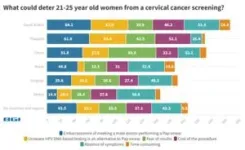(Press-News.org) CHAPEL HILL, N.C. – Cases of human papillomavirus (HPV)-associated cancers of the head and neck, known as head and neck squamous cell carcinoma (HNSCC), are rapidly increasing throughout the United States. Unfortunately, relatively little is known about the factors that contribute to these tumors and what makes some tumors more aggressive and treatment-resistant than others.
To determine why some patients respond better to radiation therapy than others, researchers in UNC School of Medicine’s Department of Otolaryngology/Head and Neck Surgery and the Lineberger Comprehensive Cancer Center formed a robust collaboration with researchers at Yale Cancer Center, the Yale Head and Neck Cancer Specialized Program of Research Excellence (SPORE), and the ECOG-ACRIN Cancer Research Group (ECOG-ACRIN).
Together, they published a new study in Proceedings of the National Academy of Sciences, which reveals that HPV+ head and neck cancers can be divided into two distinct subtypes that determine how well patients will respond to therapy, with one subtype being more responsive to radiation therapy. Researchers also discovered a new mechanism of HPV carcinogenesis through the study which enhances growing efforts to personalize treatment for patients with HPV+ HNSCC.
“We're the first ones to describe these two subtypes,” said Wendell Yarbrough, MD, MMHC, FACS, the Thomas J. Dark Distinguished Professor of Otolaryngology/Head and Neck Surgery, “Using this research, we can firmly identify two groups of patients and are able to associate their tumor subtype with treatment outcomes.”
Currently, many patients with HPV+ HNSCC are treated with high doses of radiation combined with chemotherapy. But the side effects - which include muscle fibrosis, swallowing difficulties, and artery hardening - can last a lifetime. Personalized therapy may allow oncologists to make better treatment choices for their patients; however, it can be difficult for doctors to determine the type and intensity of treatment without knowing how the patient’s tumor will respond to therapy.
To address this need, members of Yarbrough’s team, including Travis Schrank, MD, PhD, Natalia Isaeva, PhD, and Wesley Stepp, MD, PhD, who were also co-authors ion the paper, began coordinating a research cohort at UNC, grabbing publicly available data from the University of Chicago, and some validation data from E1308, a large national cooperative group clinical trial that was done through ECOG-ACRIN.
They then analyzed the tumor samples and identified several groups of co-expressed genes. Only one of these co-expressed gene sets separated tumors with high and low expression, and analysis of genes in this set found that they represented targets of a master transcription factor called NF-kB. NF-kB plays important roles in inflammation and cell death and has been associated with carcinogenesis of HNSCC.
Much to their surprise, researchers found the two distinct subtypes directly correlated with patient outcomes. Tumors with low NF-kB activity were associated with worse prognosis, while tumors with high NF-kB activity were associated with a better prognosis.
The subtypes identified by high or low NF-kB activity were remarkably different from one another, from the genes that were mutated in the cancers, factors driving the mutations, the number of mutations per cancer, HPV gene expression, HPV integration, gene methylation, and infiltration of certain immune cells into the tumor.
“One of our very tenacious, intelligent residents, Wesley Stepp, who is a co-author in the paper, was really instrumental in organizing that set of patients in the UNC cohort,” said Schrank. “All of the organizations that collaborated on this research project were very willing to work with us.”
Patient survival was the most obvious, and important, distinction between the two types of tumors. To get a better understanding of why one subtype may have better outcomes, researchers constructed cellular models of each subtype in the lab.
“Tumors with high NF-kB activity were more responsive to radiation therapy potentially contributing to improved patient survival,” said Yarbrough. “We know that there's something about activating the NF-kB pathway that makes the tumors more sensitive to radiation therapy, which could explain how and why those patients are surviving better.”
Ultimately, this data could be used to identify patients whose therapy can be safely de-intensified in order to treat the tumor, lessen side effects, and enhance quality of life. Now that researchers have more of an understanding of the new mechanism of HPV carcinogenesis, the findings may lead to the development of new, personalized treatments that are more efficient and have fewer side effects.
END
Researchers identify two new subtypes of HPV-associated head and neck cancers
Researchers in UNC School of Medicine’s Department of Otolaryngology/Head and Neck Surgery and collaborators at Yale Cancer Center and ECOG-ACRIN Cancer Research Group have identified two subtypes of human papillomavirus positive head and neck cancers,
2023-07-31
ELSE PRESS RELEASES FROM THIS DATE:
Endocrine Society and Matchbox Virtual Media announce joint venture
2023-07-31
WASHINGTON—The Endocrine Society and Matchbox Virtual Media are pleased to announce today that the organizations formed a joint venture that will bring exciting new opportunities for medical, healthcare, and scientific associations to better customize the experiences of their customers relative to producing meetings, organizing communities, and disseminating educational products.
The new joint venture will benefit from the Endocrine Society’s initial financial investments and its robust networking within the medical and scientific fields. Matchbox Virtual Media brings its proven platform, technologies, ...
Scientist who expands chemists’ tools joins The Wertheim UF Scripps Institute
2023-07-31
JUPITER, Fla. — A new scientist joining The Herbert Wertheim UF Scripps Institute for Biomedical Innovation & Technology invents creative and efficient ways to build complex, potentially useful molecules, studying their activity so that compounds found in nature may eventually become useful products, such as medications.
Synthetic chemist and associate professor Masayuki Wasa, Ph.D., joins the institute from Boston College, where he was an assistant professor of chemistry. Synthetic chemists specialize in assembling larger molecules from smaller parts, like a child assembling a Lego spaceship from a basket of oddly shaped pieces.
But the work is far from child’s ...
Thomas J. Herzog, MD takes office as The GOG Foundation, Inc. President
2023-07-31
At the NRG Oncology Summer Meeting on Thursday, July 20, 2023, at approximately 5:44pm EDT, Larry J. Copeland, MD passed the presidential gavel to Thomas J. Herzog, MD at The GOG Foundation, Inc. (GOG-F) Board of Directors meeting.
Dr. Herzog brings a comprehensive background in clinical trials, the integral business aspects and acumen to this important position. A practicing gynecologic oncologist and member of the Board of Directors of GOG-F, he has served as the Treasurer of GOG-F from 2014-2023 and prior ...
ACP issues updated guidance for colorectal cancer screening of asymptomatic adults
2023-07-31
Embargoed for release until 5:00 p.m. ET on Monday 31 July 2023
Annals of Internal Medicine Tip Sheet
@Annalsofim
Below please find summaries of new articles that will be published in the next issue of Annals of Internal Medicine. The summaries are not intended to substitute for the full articles as a source of information. This information is under strict embargo and by taking it into possession, media representatives are committing to the terms of the embargo not only on their own behalf, but also on behalf ...
Why you shouldn’t declaw tigers or other big cats
2023-07-31
Declawing house cats to keep them from scratching people and furniture is controversial – and even banned in some countries and areas in the U.S. – but the practice is not limited to house cats. In a new study, researchers looked at the effects of declawing on larger cat species and found that declawing disproportionately impacts their muscular capabilities as compared to their smaller brethren.
While it is illegal in the U.S. to surgically modify an exotic animal, declawing is still done on large cats like lions and tigers, often in an effort to allow cubs to more safely ...
Cutting-edge cancer research lab opens operations at Pepper Place
2023-07-31
BIRMINGHAM, Ala. – Birmingham’s Pepper Place has a striking new addition to its teeming farmers’ market and noted food offerings — a multimillion-dollar cancer research laboratory.
The lab is IN8bio’s new research and development facility in the Martin Biscuit Building at Pepper Place. This R&D space has about 6,000 square feet of wet lab space and around 4,000 square feet for offices, conferences and break areas. IN8bio is a biotechnology company focused on developing novel cellular therapies for cancer, with deep roots in cutting-edge cancer research developed at ...
New UArizona study links brain waves directly to memory
2023-07-31
Neurons produce rhythmic patterns of electrical activity in the brain. One of the unsettled questions in the field of neuroscience is what primarily drives these rhythmic signals, called oscillations. University of Arizona researchers have found that simply remembering events can trigger them, even more so than when people are experiencing the actual event.
The researchers, whose findings are published in the journal Neuron, specifically focused on what are known as theta oscillations, which emerge in the brain's hippocampus region during activities like exploration, navigation and sleep. The hippocampus plays ...
New chemical process makes it easier to craft amino acids that don’t exist in nature
2023-07-31
Every protein in your body is made up of the same 20 building blocks called amino acids. But just because nature is stuck with a limited toolkit doesn’t mean humans can’t expand it.
A study published in Science on July 27 by a team including Pitt chemists describes a powerful new way to create “unnatural” amino acids, which could find use in protein-based therapies and open up novel branches of organic chemistry.
“This is a completely new transformation: new to nature and new to chemistry,” ...
Social media marketing most effective when it prompts consumers to start posting
2023-07-31
Social media is a critical marketing tool to help raise awareness when firms launch new products. The platforms can help inform consumers about product characteristics and benefits relative to competitors’ products.
New research from the University of Notre Dame analyzes data from the motion picture industry, which often relies on social media promotion, in an effort to understand how marketers could better promote other new products.
“The Ripple Effect of Firm-Generated Content on New Movie Releases,” forthcoming in the Journal of Marketing Research ...
Study shows new stroke surgery eligibility criteria may dramatically increase lifesaving stroke surgery rates, with nationwide implications
2023-07-31
Study Shows New Stroke Surgery Eligibility Criteria May Dramatically Increase Lifesaving Stroke Surgery Rates, with Nationwide Implications
SAN DIEGO—A recent study presented today at the Society of NeuroInterventional Surgery’s (SNIS) 20th Annual Meeting noted that U.S. rates of endovascular thrombectomy, a lifesaving stroke treatment, are projected to increase dramatically based on new criteria.
In the study, endovascular thrombectomy was shown to improve clinical outcomes in patients with large ischemic strokes. This change has the ...
LAST 30 PRESS RELEASES:
Children born with upper limb difference show the incredible adaptability of the young brain
How bacteria can reclaim lost energy, nutrients, and clean water from wastewater
Fast-paced lives demand faster vision: ecology shapes how “quickly” animals see time
Global warming and heat stress risk close in on the Tour de France
New technology reveals hidden DNA scaffolding built before life ‘switches on’
New study reveals early healthy eating shapes lifelong brain health
Trashing cancer’s ‘undruggable’ proteins
Industrial research labs were invented in Europe but made the U.S. a tech superpower
Enzymes work as Maxwell's demon by using memory stored as motion
Methane’s missing emissions: The underestimated impact of small sources
Beating cancer by eating cancer
How sleep disruption impairs social memory: Oxytocin circuits reveal mechanisms and therapeutic opportunities
Natural compound from pomegranate leaves disrupts disease-causing amyloid
A depression treatment that once took eight weeks may work just as well in one
New study calls for personalized, tiered approach to postpartum care
The hidden breath of cities: Why we need to look closer at public fountains
Rewetting peatlands could unlock more effective carbon removal using biochar
Microplastics discovered in prostate tumors
ACES marks 150 years of the Morrow Plots, our nation's oldest research field
Physicists open door to future, hyper-efficient ‘orbitronic’ devices
$80 million supports research into exceptional longevity
Why the planet doesn’t dry out together: scientists solve a global climate puzzle
Global greening: The Earth’s green wave is shifting
You don't need to be very altruistic to stop an epidemic
Signs on Stone Age objects: Precursor to written language dates back 40,000 years
MIT study reveals climatic fingerprints of wildfires and volcanic eruptions
A shift from the sandlot to the travel team for youth sports
Hair-width LEDs could replace lasers
The hidden infections that refuse to go away: how household practices can stop deadly diseases
Ochsner MD Anderson uses groundbreaking TIL therapy to treat advanced melanoma in adults
[Press-News.org] Researchers identify two new subtypes of HPV-associated head and neck cancersResearchers in UNC School of Medicine’s Department of Otolaryngology/Head and Neck Surgery and collaborators at Yale Cancer Center and ECOG-ACRIN Cancer Research Group have identified two subtypes of human papillomavirus positive head and neck cancers,






